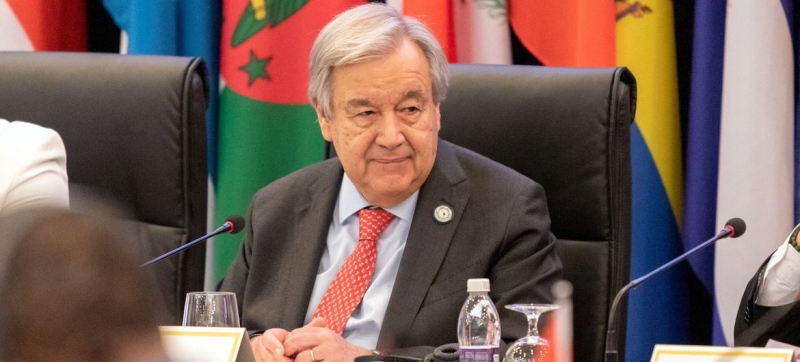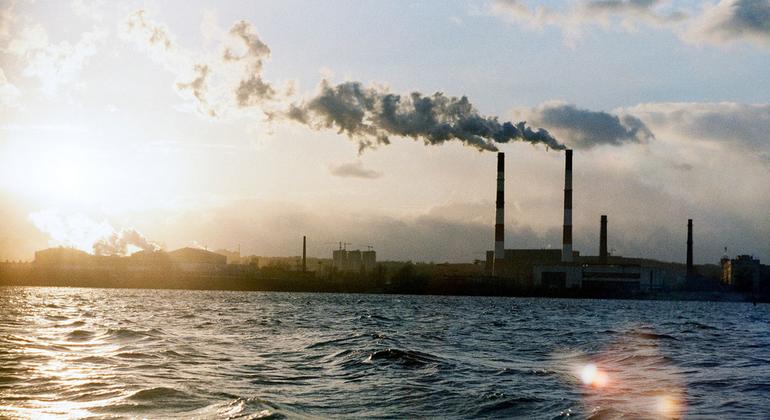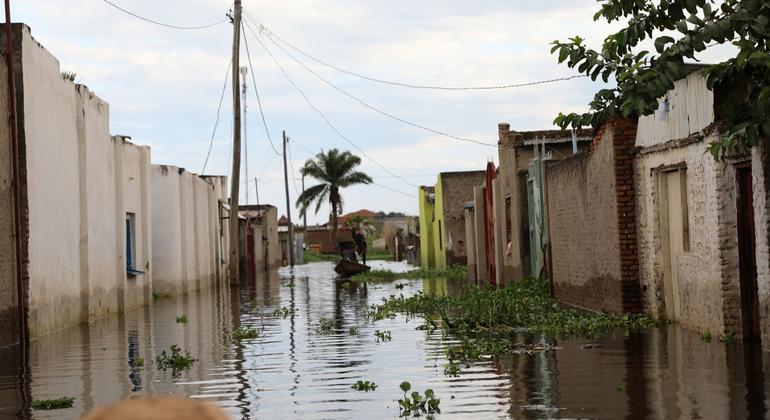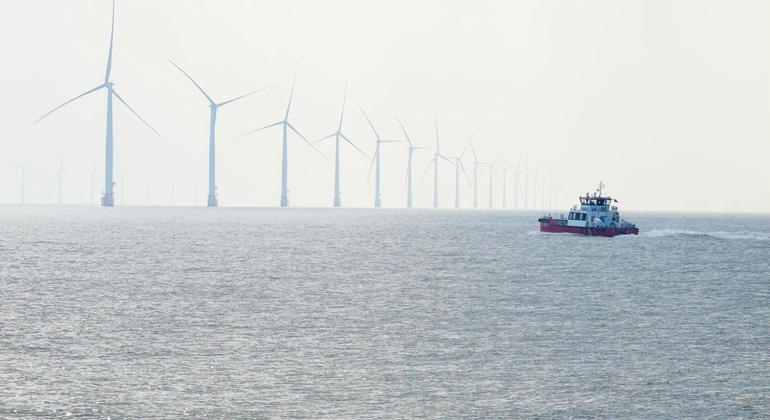
UN Chief Antonio Guterres. UN Chief: Very Little Chance Left to Prevent Climate Disaster Climate and Environment
We have already experienced twelve of the hottest months on record in a row. This was announced by UN Secretary-General Antonio Guterres, speaking at the American Museum of Natural History in New York on the occasion of World Environment Day.
The UN chief cited data from the Copernicus Climate Change Service published on June 5, according to which May 2024 became the next hottest month on record.
“We’re not just in danger. We are the danger. But we can also solve this problem,” said Guterres.
Global warming
He stressed that almost 10 years after the Paris Agreement was adopted, there was little chance of keeping global warming to within 1.5 degrees Celsius.
“Brand new data from leading climate scientists released today shows that the remaining carbon budget to keep global warming to 1.5 degrees is now about 200 billion tons We’re burning through this budget at a reckless rate – releasing about 40 billion tons of carbon dioxide into the atmosphere per year. At this rate of emissions, the entire carbon budget will be exhausted before 2030,” said the Secretary General.
Global emissions must fall by nine percent each year until 2030 to keep warming to 1.5 degrees, he said. However, emissions increased by one percent last year. global average temperature of 1.5 degrees in at least one of the next five years. Moreover, in 2015, the probability of exceeding such a limit was close to zero.
There is also a 50 percent chance that the average temperature for the entire next the five-year period will be 1.5 degrees higher than in the pre-industrial era, Guterres said.
Climate justice
“Everything depends on what decisions world leaders will make or not take, especially in the next eighteen months,” the UN chief said.
He recalled the climate talks in Bonn and the upcoming G7 and G20 summits, the UN General Assembly and the 29th UN Climate Conference, where countries must “set themselves the most serious goals, to accelerate their achievement as much as possible and to cooperate with each other to the maximum extent.”
Already today we are going beyond the capabilities of our planet, the Secretary General recalled, and at the same time the principle of climate justice is violated, since those who are least to blame for the crisis suffer the most.

According to Guterres, the richest one percent of the world’s people account for as much carbon emissions as two-thirds of humanity. And even if emissions were reduced to zero tomorrow, climate chaos would still cost us at least $38 trillion a year between now and 2050, according to a recent study. Meanwhile, the fossil fuel industry is gaining record profits and “feasting on trillions in taxpayer-funded subsidies.”
“We have everything we need to save ourselves. Our forests, our wetlands and our oceans absorb carbon from the atmosphere,” said the Secretary General.
“And we have technologies needed to reduce emissions,” he added.
The UN chief noted that renewable energy already accounts for 30 percent of global electricity supply, and investment in clean energy reached a record level last year.
“Economic logic dictates that the era of fossil fuels will inevitably come to an end,” Guterres said. “Only two questions remain: will this era end on time? and will there be a fair transition process? We must ensure that the answer to both of these questions is “yes.”
This means urgent action is needed, especially in the next eighteen months, to cut emissions, protect people and nature from extreme climate events, expand climate finance and provide pressure on the fossil fuel industry.
Cut emissions
G20 countries account for 80 percent of global emissions, so, according to the Secretary General, they have the responsibility and opportunity to take the lead in reducing emissions.

Guterres recalled that next year governments must report on so-called nationally determined contributions. These climate action plans will set emission levels for the coming years, and every country must play its part.
The UN chief also called on scientists and engineers to focus on carbon dioxide removal and storage processes, and for governments to support them. However, such technologies are no substitute for radical emissions reductions.
Protect people and nature
“It is simply a shame that the most vulnerable sections of the population are left to their fate,” said Antonio Guterres.
By 2027, every person on Earth should be protected with the help of early warning systems, the Secretary General believes. He called on all partners to more actively support the UN action plan “Early Warning Systems for All”.
The UN chief also recalled that the G7 opened the Adaptation Acceleration Center in April. By the 29th session of the UN Climate Conference, this initiative must be translated into concrete actions, Guterres emphasized, to support developing countries in developing adaptation investment plans and their implementation in practice.
Read also:
INTERVIEW | The likelihood of drought increases in the Carpathians
At the same time, the implementation of changes on the ground will depend on how much money is allocated for this. There are only about five cents of every dollar needed to adapt to extreme weather events. These data were cited by the head of the UN in his speech.
“As a first step, all developed countries must meet their commitment to double adaptation funding to at least $40 billion per year by 2025,” he stressed. “And they must develop a clear action plan to close adaptation financing gaps by the 29th session of the Conference of the Parties [to the United Nations Framework Convention on Climate Change], which takes place in November.”
Climate finance
The global financial system must be involved in solving the climate problem, as payments are exorbitant the national debt absorbs funds to combat climate change, the Secretary General believes.
“The Future Summit, which will take place in September this year, will provide a chance advance reform of the international financial architecture and take action to address the debt problem,” he said. “I urge countries to take advantage of this opportunity.”
Countries must also make significant contributions to the new Loss and Damage Fund and ensure it is operational by the next session of the Conference of the Parties, Guterres said. They should also achieve significant financial results from the Conference this year.
But this will not be enough without innovative sources, according to the UN chief funding: “It’s time to put a real price on carbon and tax the windfall profits of fossil fuel companies.”

Apply pressure
“We must directly confront those in the industry fossil fuels, which have demonstrated a relentless zeal to obstruct progress for decades,” said the Secretary-General.
He thanked scientists, activists and journalists who have exposed the industry’s unfair practices, and called on fossil fuel industry leaders to realize that if they don’t switch to clean energy now, they will be “driving their business to a dead end.”
He also called on financial institutions to stop supporting fossil fuels and start investing in renewable energy.
The secretary general recalled the “pseudo-ecological self-promotion” and called on advertising agencies and public relations companies to stop acting as “accomplices of planetary destruction.”
According to Guterres, countries should consider banning advertising from companies that extract fossil fuels. He called on news media and tech companies to stop such advertising.
“Each of us can do our part by moving to clean technologies, by moving away from fossil fuels in our lives, and by using our citizen power to drive systemic change,” the UN chief continued.
According to him, the Organization is working hard: building trust, seeking solutions, and leading by example for the cooperation our world so desperately needs.
“And to the young people, civil society, cities, regions, businesses and others who are leading the charge for a safer and cleaner world, I say thank you,” Guterres said.
“It is time to mobilize efforts, it is time to act, it is time to achieve results,” he concluded his speech.
